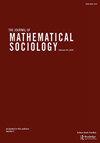你和我能做些什么来减少收入不平等?
IF 1.3
4区 社会学
Q3 MATHEMATICS, INTERDISCIPLINARY APPLICATIONS
引用次数: 4
摘要
摘要:普通人在私生活中能做些什么来减少经济不平等吗?如果是这样的话,这些东西将如何运作?可以肯定的是,有减少不平等的宏观社会机制。但是,是否存在减少不平等的微观机制?本文首先考察了产生不平等效应的不平等措施和行为模型,确定了五组导致普通人可以用来减少收入不平等的杠杆的不平等机制,然后讨论了这些杠杆,特别注意它们的可行性、易用性和副作用。这五个杠杆强调了转移、平等添加、负匹配、奖励多种个人特征的工资表,以及带有投票规则、众多选民、思想多样性和无记名投票的补偿程序。这项工作为研究提出了新的问题,例如思想多样性的来源。本文章由计算机程序翻译,如有差异,请以英文原文为准。
What can you and I do to reduce income inequality?
ABSTRACT Are there things that ordinary people can do in their private lives to reduce economic inequality? And, if so, how would these things work? To be sure, there are macro societal mechanisms for reducing inequality. But are there micro mechanisms for reducing inequality? This article first examines inequality measures and behavioral models that produce inequality effects, identifying five sets of inequality mechanisms which lead to levers that ordinary people can use to reduce income inequality, and next discusses the levers, with special attention to their feasibility, ease of use, and side effects. The five levers highlight transfers, equal additions, negative assortative mating, wage schedules that reward multiple personal characteristics, and compensation procedures with voting rules, many voters, diversity of thought, and secret ballots. This work raises new questions for research, such as the sources of diversity of thought.
求助全文
通过发布文献求助,成功后即可免费获取论文全文。
去求助
来源期刊

Journal of Mathematical Sociology
数学-数学跨学科应用
CiteScore
2.90
自引率
10.00%
发文量
5
审稿时长
>12 weeks
期刊介绍:
The goal of the Journal of Mathematical Sociology is to publish models and mathematical techniques that would likely be useful to professional sociologists. The Journal also welcomes papers of mutual interest to social scientists and other social and behavioral scientists, as well as papers by non-social scientists that may encourage fruitful connections between sociology and other disciplines. Reviews of new or developing areas of mathematics and mathematical modeling that may have significant applications in sociology will also be considered.
The Journal of Mathematical Sociology is published in association with the International Network for Social Network Analysis, the Japanese Association for Mathematical Sociology, the Mathematical Sociology Section of the American Sociological Association, and the Methodology Section of the American Sociological Association.
 求助内容:
求助内容: 应助结果提醒方式:
应助结果提醒方式:


